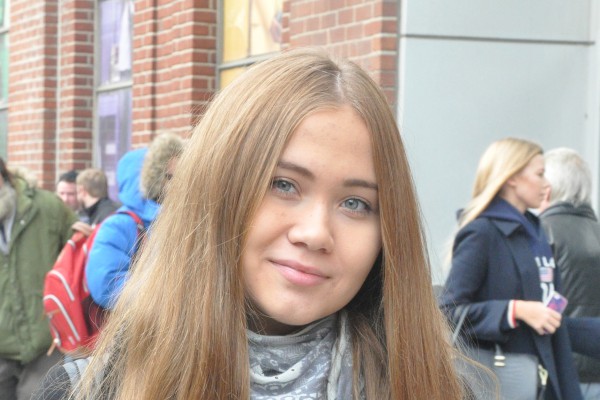The conflict in the Ukraine has affected students’ friendships at George Brown College

International student from Russia, Julia Babicheva says that Russian and Ukrainian friendships
are being torn apart by the conflict. Photo: Yuliya Prisyazhnaya/The Dialog
Russians and Ukrainians used to be close friends until this year. The conflict that began in January 2014 in Ukraine, has resulted in Russian and Ukrainian students at George Brown College (GBC) not being as good of friends as they were before.
“My Ukrainian friend told me that his parents are telling him not to communicate with Russians,” said Julia Babicheva, an international student at GBC from Russia. “Also, my Ukrainian acquaintances will mention nationalistic slogans towards Russians, and I heard them many times but I never take them personally, however, I know some people who do.”
Some students from Russia and Ukraine have stopped communicating with each other entirely, while others are trying to avoid conversations about this conflict to save friendships.
We can only find out what happens in the Ukraine in the news, but what happens between people from these countries in Toronto, and how they communicate, we can only find out by asking them.
“How can students argue about this conflict while we are living in Canada, far from Ukraine, we can only watch the news which is not always correct,” said Alona Pak, an international student at GBC from Ukraine. “We don’t have evidence about these events, and we can only guess what is going on there. Russians and Ukrainians don’t need to prove who is right and who is wrong because we will never know the real truth.”
“The initiative mostly goes from Ukrainians because they see Russian people pictured in media and therefore making implications that Russian people are in charge of the terrible losses,” said Babicheva. “In fact, we—ordinary people who immigrated to Canada, have nothing to do with the conflict. We are not responsible for the political games, and they should not affect the relationship between Russians and Ukrainians.”
The first disturbances began in the Maidan Independence Square in Kiev, where activists protested against the Ukrainian president Viktor Yanukovych, and corruption in the country.
Activists wanted Ukraine to join the National Atlantic Treaty Organisation (NATO) and the European Union due to their beliefs that European countries could support them in politics and the economy. However, eastern Ukrainians believed in support from the Russian government; the Ukraine was split into two.
After Russian President Vladimir Putin unexpectedly made the Crimea Peninsula part of Russia, in March 2014, his actions led to serious protests from Ukrainians, and from that moment on the war had started.
“This situation in Ukraine is undoubtedly devastating for everyone and especially for those whose families and friends are in Ukraine right now,” said Babicheva. “Personally I’ve never separated Russians and Ukrainians into two different nations, we all originate from the same country and I don’t see almost any cultural differences between both (of them).”

